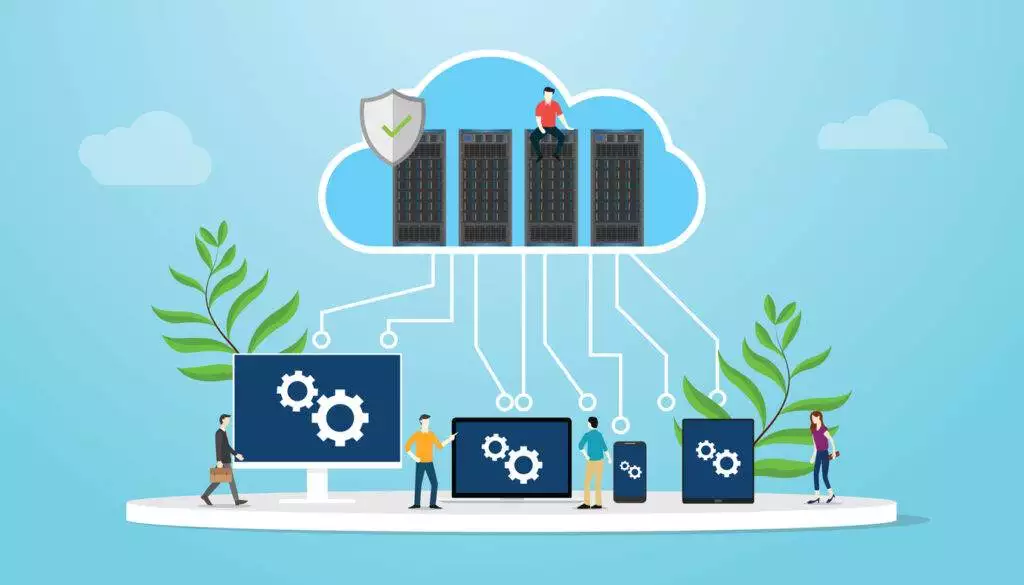Unveiling the Strategic Role of a vCIO
In today’s tech-driven business landscape, the role of a Chief Information Officer (CIO) holds immense significance. However, not every company requires a full-time CIO or has the resources to support one. This is where a virtual CIO (vCIO) steps in.
A vCIO is an outsourced professional who offers strategic guidance and expertise in managing and maximizing technology within an organization. They seamlessly integrate with your team to align IT strategies with your overarching business objectives.
Here are some crucial insights into the role of a vCIO:
Distinguishing features between traditional CIOs and vCIOs:
- A traditional CIO typically holds an executive-level position within a company, overseeing all aspects of information technology.
- On the other hand, a vCIO provides part-time or fractional services to multiple clients, offering strategic advice without being physically present at your office.
Businesses that stand to gain from partnering with a vCIO:
- Small and medium-sized businesses seeking expert IT management without the cost burden of hiring full-time executives.
- Companies experiencing rapid growth or undergoing digital transformation.
- Organizations aiming to bolster their cybersecurity measures and risk management practices.
By enlisting the expertise of a proficient vCIO, you can access top-tier knowledge while avoiding hefty expenses associated with recruiting an in-house C-level officer.
The Invaluable Benefits of Engaging with a vCIO through an MSP
The Value of a vCIO through an MSP
In today’s tech-driven business landscape, the role of a Chief Information Officer (CIO) is more crucial than ever. However, not every company has the need or resources for a full-time CIO. This is where a virtual CIO (vCIO) through a Managed Service Provider (MSP) can make all the difference.
How an MSP delivers vCIO services:
- An MSP specializes in providing managed technical services to businesses, offering expert IT support and consulting.
- Partnering with an MSP gives you access to their team of experienced professionals who can serve as your virtual CIO.
- These experts will closely collaborate with your business to understand its objectives and develop strategic IT plans aligned with those goals.
The cost-effectiveness of an MSP vCIO:
- Hiring a full-time CIO can be costly, especially for small and medium-sized businesses.
- With an MSP vCIO, you only pay for the specific services you require when you need them.
- This allows you to tap into top-tier expertise without exceeding your budget.
The flexibility and scalability offered by an MSP vCIO:
- As your business grows or undergoes changes in its technology needs, having access to adaptable resources becomes essential.
- An MSP provides scalable solutions that can adjust to your evolving requirements.
- Whether it’s expanding your infrastructure or integrating new technologies, they possess the expertise and resources needed to support these initiatives.
By leveraging the services of an MSP vCIO, you receive tailored strategic guidance for your business while managing costs effectively and maintaining operational flexibility.
Key Benefits of Having a Virtual Chief Information Officer for Your Business
Key Benefits of a vCIO for Your Business
In today’s tech-driven world, the role of a Chief Information Officer (CIO) is crucial for businesses. However, not every company has the need or resources to hire a full-time CIO. This is where a virtual CIO (vCIO) from an MSP can make all the difference.
A vCIO is an outsourced officer who takes on the responsibilities and functions of a traditional CIO but works remotely as part of your team. They bring their expertise in IT strategy, management, and technical services to help your business thrive in today’s digital landscape.
Here are some very important benefits that having a vCIO can bring to your business:
Strategic IT Planning and Implementation:
A vCIO brings strategic thinking and planning to your organization’s IT infrastructure. They work closely with you to understand your business goals and align them with technology solutions that drive growth and efficiency. By developing an IT roadmap tailored specifically to your needs, they ensure that technology investments are aligned with long-term objectives.
Enhanced Cybersecurity Measures:
Cyber threats are constantly evolving, making it crucial for businesses to stay ahead of potential risks. A vCIO helps implement robust cybersecurity measures by conducting risk assessments, implementing security protocols, training employees on best practices, and monitoring systems for any vulnerabilities or breaches. Their proactive approach ensures that your data remains secure at all times.
Cost Control Strategies:
Managing IT expenses can be challenging without proper expertise in budgeting and cost control strategies from managed service providers like MSPs. A vCIO brings financial acumen to the table by analyzing current spending patterns, identifying areas for optimization or cost reduction while ensuring essential services remain intact.
Access to Latest Technology Trends:
Keeping up with rapidly changing technology trends can be overwhelming for businesses trying to focus on their core operations. A vCIO stays updated on emerging technologies relevant to your industry so that you can leverage them to gain a competitive edge. They provide insights and recommendations on the latest software, hardware, and IT innovations which add value.
By leveraging the expertise of a virtual chief information officer from an MSP, businesses can benefit greatly from strategic IT planning, improved cybersecurity measures, enhanced budgeting strategies, and access to the latest technological trends. These advantages enable companies to consult better while staying ahead in today’s digital landscape.
How a vCIO Can Drive Business Growth
How a vCIO Can Drive Business Growth
In today’s rapidly evolving digital landscape, having a virtual Chief Information Officer (vCIO) is crucial for driving business growth and success. A vCIO is an experienced professional who provides strategic guidance and support for all things related to information technology (IT). Let’s dive into the essential role of a vCIO in driving business growth and how they can help align IT with your business goals.
Driving Digital Transformation:
Digital transformation is vital for businesses to stay competitive in today’s fast-paced world. A vCIO plays a pivotal role in guiding organizations through this process by leveraging technology to drive innovation, efficiency, and customer satisfaction. They have extensive knowledge of emerging technologies and trends that can transform your business operations.
Aligning IT with Business Goals:
A key responsibility of a vCIO is ensuring that your IT strategy aligns with your overall business objectives. By understanding your company’s vision, mission, and goals, they can develop an IT roadmap that supports these aspirations. Whether it’s improving operational efficiency or enhancing customer experience, the vCIO will work closely with you to identify opportunities where technology can make a significant impact.
A vCIO isn’t just an IT consultant but rather a strategic partner who helps businesses thrive in the digital age. By understanding unique needs and aligning IT initiatives with overall objectives, they drive innovation, improve operational efficiency, enhance cybersecurity measures, ultimately contributing to bottom-line success. If you’re looking to elevate your business performance, consider exploring the services of a skilled MSP offering expert-level virtual CTO services – it could be exactly what you need!
Choosing the Right MSP for vCIO Services
Choosing the Right MSP for vCIO Services
In today’s rapidly changing technological landscape, having a virtual Chief Information Officer (vCIO) is crucial for driving business growth. A vCIO goes beyond being just an IT consultant; they are a strategic partner who understands how technology intersects with your business objectives. Let’s delve into the pivotal role of a vCIO in digital transformation and how they can help align your IT with your overall business goals.
The Role of a vCIO in Digital Transformation:
Digital transformation is essential for businesses to remain competitive in today’s fast-paced world. It involves using technology to streamline processes, enhance customer experiences, and drive innovation. A vCIO plays a critical role by:
- Assessing current technological capabilities: Conducting an extensive analysis of your existing IT infrastructure to identify areas for improvement and optimization.
- Developing a comprehensive strategy: Creating a roadmap for digital transformation tailored to your specific business needs based on their findings.
- Implementing new technologies: Overseeing the implementation of cutting-edge solutions that align with your strategic objectives.
- Monitoring progress and making adjustments: Continuously monitoring performance metrics throughout the digital transformation journey and adjusting strategies as needed.
Aligning IT with Business Goals:
Many businesses struggle with ensuring that their IT initiatives align with their overall business goals. This is where an experienced vCIO excels by:
- Understanding unique challenges: Immersing themselves in your organization’s operations, culture, and long-term vision to gain deep insights into what drives success for your business.
- Translating technical jargon into actionable insights: Bridging the communication gap between technical teams and key stakeholders to ensure everyone is on the same page.
- Identifying opportunities for innovation: Keeping abreast of emerging technologies and industry trends while proactively identifying opportunities to leverage them for business growth.
Real-world Examples of Businesses Benefiting from a vCIO:
To truly grasp the impact of having a dedicated vCIO on driving business growth, let’s examine some real-world examples:
- Applemill Inc, struggled with outdated legacy systems hindering their ability to scale and innovate until partnering with our MSP and leveraging our vCIO services which enabled them to successfully undergo digital transformation. The result was implementing cloud-based solutions, streamlining processes, and improving overall efficiency.
- MB of Honolulu wanted to expand its online presence but lacked technical expertise until guidance from our knowledgeable vCIO helped develop an e-commerce strategy that not only increased sales but also enhanced customer satisfaction through personalized experiences.
In both cases, expert advice provided by dedicated vCIOs enabled these businesses to achieve their growth objectives through strategic planning.
By leveraging the expertise of virtual Chief Information Officer (vCIOs), you can drive digital transformation initiatives aligned with your goals while staying ahead technologically – it’s truly invaluable investment in future success!
The Strategic Advantage of a vCIO
The Strategic Advantage of a vCIO
In today’s tech-driven world, having a Chief Information Officer (CIO) is crucial for businesses. However, not every business has the resources or need for a full-time CIO. This is where a virtual CIO (vCIO) from an MSP can make all the difference. Let’s dive into the key benefits that a vCIO can bring to your business.
Strategic IT Planning and Implementation:
A vCIO offers expert guidance in strategic IT planning and implementation tailored to your specific goals and objectives. By leveraging their expertise, they help you make informed decisions about technology investments that align with your long-term business objectives.
Enhanced Cybersecurity and Risk Management:
With cybersecurity threats constantly evolving, it’s essential to stay ahead of potential risks. A vCIO plays a vital role in enhancing cybersecurity measures by conducting regular risk assessments, implementing robust security protocols, and staying up-to-date with industry trends and best practices.
Optimized IT Budgeting and Cost Control:
Effective management of IT expenses is critical for any business’s financial health. A vCIO helps optimize your IT budget by identifying areas where costs can be reduced without compromising performance or security standards while also forecasting future technology needs.
Access to Latest Technology Trends and Insights:
Staying updated on technological advancements is key to maintaining competitiveness in today’s digital landscape. A vCIO keeps tabs on emerging technologies relevant to your industry and provides valuable insights into how these innovations could benefit your operations or give you a competitive edge over rivals.
In conclusion, partnering with a vCIO through an MSP brings numerous benefits such as strategic IT planning, enhanced cybersecurity measures, optimized budgeting, cost control strategies, access to the latest technology trends & insights – all without needing a full-time CIO on staff so you can focus on core activities while ensuring aligned technology infrastructure.






